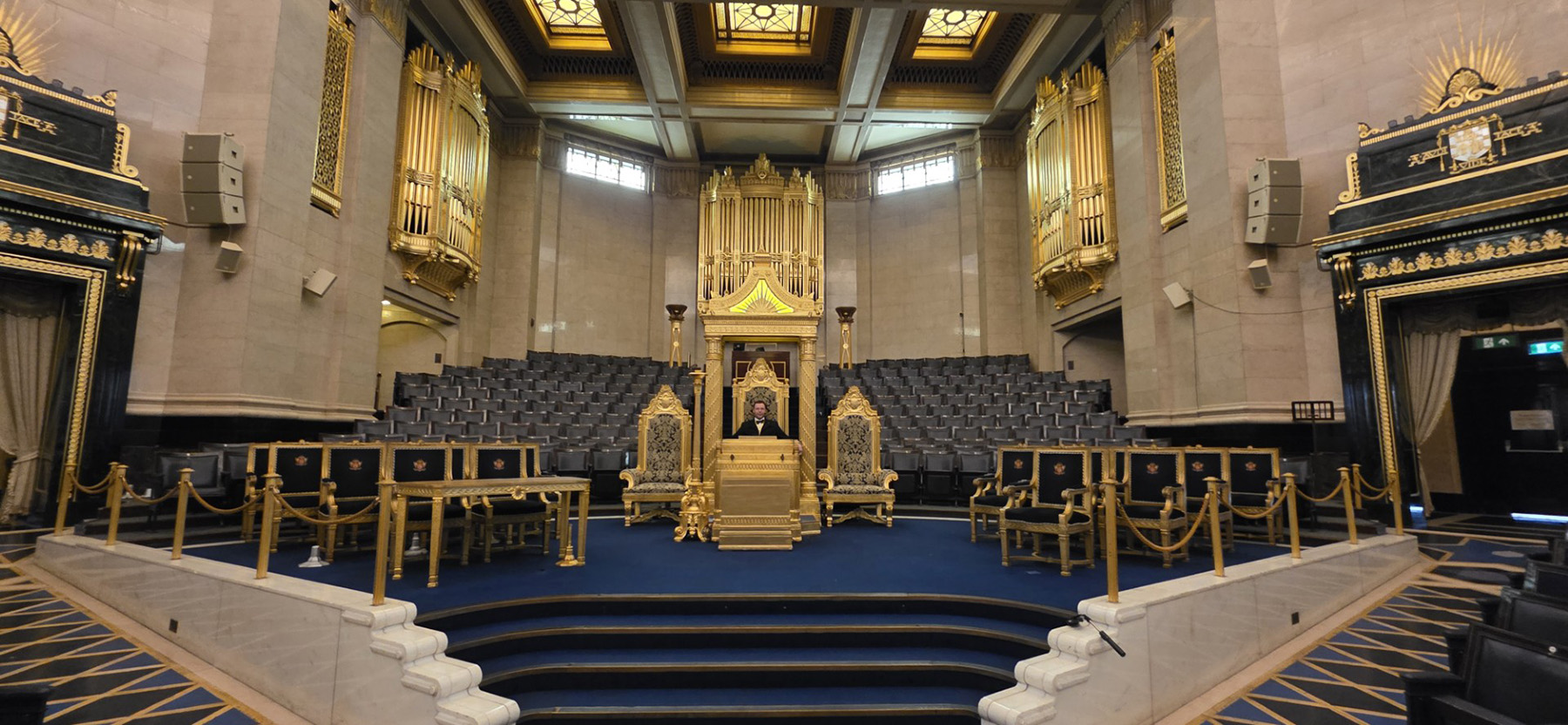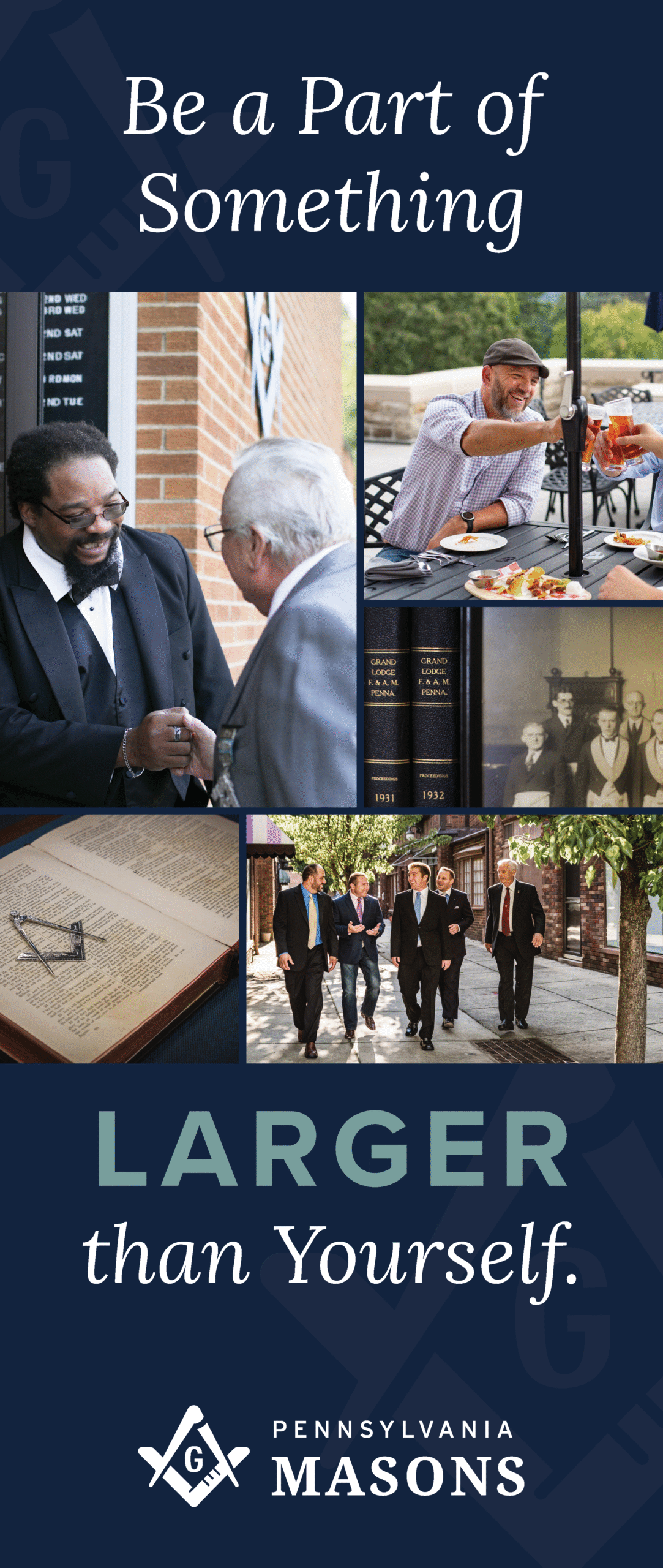Exploring Freemasonry Abroad
Brothers Spencer Talbot and Krzysztof Wojtak, William L. Elkins Lodge No. 271, Philadelphia, spent the month of June traveling around Europe, sightseeing, hiking and visiting other fraternal lodges to broaden their Masonic education.
Krzysztof visited the United Grand Lodge of England and the Grand Lodge of Norway. Later, he met up with Spencer and the two traveled to lodges in Paris, France, and A Coruña, in the Galicia region of Spain.
Both men said the experience was invaluable and they enjoyed learning firsthand how lodges abroad compare with those in the United States, and specifically, Pennsylvania.
“I just joined the fraternity recently, so it was interesting to see what people think of Masonry elsewhere and how it’s done,” Krzysztof said. “It was a really fascinating, welcoming journey just to have other Masons embrace us wherever we traveled.”
Krzysztof, 38, recently completed his medical residency at the University of Pennsylvania and decided to travel. He began his journey in Norway after connecting with the country’s Grand Lodge.
While their Masonic Hall is typically closed on Saturdays, Krzysztof arranged for a personal tour. He was also invited to a lodge initiation ceremony the following Monday.
“Being able to explore the Freemason Hall was phenomenal,” he said. “It was very informative to see how they do things there. They have a different degree system than we have. There were more than 100 people there. Everyone spoke English, and they provided an English translation so I could follow along during the ceremony.”
When visiting the United Grand Lodge of England, considered one of the oldest social and charitable
organizations in the world, Krzysztof toured the building and was invited to attend an Entered Apprentice ceremony.
“I happened to meet the Past Grand Master of China while I was in England,” he said. “I even dined with someone who had been knighted. Everything was on a grand scale [in England] and very well organized.”
The Grand Lodge of England established the Universities Scheme in 2005 to increase student
engagement in Freemasonry in towns and cities that have universities. Lodges welcome new members and those wishing to become Freemasons who are undergraduates, postgraduates, senior members of the university and alumni, beginning at age 18.
Spain and Norway are more secretive about practicing or promoting Freemasonry, Krzysztof said. Recent proclamations by the Pope made some Catholics, particularly in Spain, reconsider joining the fraternity. One of the lodges Krzysztof visited met at a secret location, using a different address than what was listed on Google.
“There were many differences between England, which was so open with a public gift shop, bar and
café, and other countries,” he said. “Some lodges were not accessible. Norway, Spain and France have especially high security, unlike England and the U.S. The Nazis weren’t on the ground there [in England or the U.S.] or setting up in Grand Lodge buildings.”
“Many things are different abroad,” Spencer added. “There are customized parts to some of the ceremonies, personalized to the individual joining, which is quite nice. In our lodge, we try to go out after meetings to promote bonding. Seeing that in other countries too … that’s the connection you want to be able to make.”
To visit lodges in other jurisdictions, Pennsylvania brethren should request an official Travel Commission (approval to travel) from the Grand Lodge, issued by the Grand Secretary’s office. A Travel Commission is only valid if it bears the original signatures of the Grand Master and Grand Secretary and the impressed seal of the Grand Lodge of Pennsylvania. It can take three to four weeks to process and deliver the Travel Commission. You may contact the Grand Secretary directly or submit your travel request online on the Grand Lodge website.
Once you receive approval, you share the travel document with the lodges you want to visit. Krzysztof suggests printing out your information from the Grand View web platform, including when you received your degrees and when you were initiated. You should also request a card from the Grand Secretary confirming you are an active, dues-paying member of the fraternity.
Krzysztof recommends visiting lodges in neighboring states before making the jump internationally. Also, do your research before you go. The Grand Lodge of England has a “find my lodge” app that lists when all the lodges are meeting. “Amity” is a Smartphone app that connects Freemasons around the world, making it easier to visit other lodges. Like a Masonic passport, Amity supports over 300 Grand Lodges around the world, and many have endorsed the app for use by their members.
Amity escalates your request to the Grand Lodge Secretary, who connects you with a lodge to visit, Spencer said. It’s recommended that you include the dates when you want to visit.
“You need to go through this process at least a month before you leave because the process can move slowly,” Spencer said. “Using WhatsApp [a free messaging and video calling app often used in other countries] is a huge benefit. A lot of the international folks communicate through that app. I used it to text with some of the members when I got there.”
As a courtesy, both Krzysztof and Spencer distributed gifts from Pennsylvania, including posters of the Masonic Temple in Philadelphia, Masonic pins, ties and other small gifts.
“We brought branded trinkets for the Worshipful Masters and officers, as well as the general body of the lodge, to thank them for having us,” Krzysztof said. “We had to be very discreet in most countries and have a bag to carry everything in.”
Spencer said Masons who travel abroad should be respectful of the country’s culture, dress code, food and drink.
“If you don’t drink liquor, make that clear ahead of time, because some members like to drink,” he said. “Also, let them know ahead of time when you need to leave somewhere so you don’t appear rude. Learn the language if you can. Leave a good impression and keep asking questions if you don’t know the answers to something.”
Traveling to lodges in different countries is a privilege and very fun, Spencer said.
“Knowing locals on the ground is the best part because you are culturally immersed,” he said. “American Masons are generally held in high esteem. We are more open about Freemasonry in the states. I’m comfortable with people knowing I’m a Mason.”



